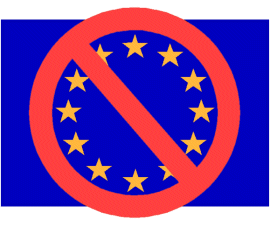Þó að þessi ríki sem eru að sækja um séu ekki jafn rík og þau lönd sem nú eru í bandalaginu þarf það ekki að vera slæmt. Það eru tugir milljóna neytenda í þessum löndum og hugsanlegir tugir milljóna viðskiptavina okkar. Með því að ganga í ESB vænkast hagur þessara landa. M.ö.o. þau verða ekki fátæk að eilífu. Innganga Spánar 1986 er besta dæmið um hvernig fátækt ríki getur unnið sig upp á tiltölulega fáum árum (ástandi eftir dauða Francotímabilið var mjög dapur og síðasta tilraun til valdaráns hersins var gerð 1980). T.a.m gæti ég hugsað mér að hugbúnaðargeirinn gæti fengið nóg af verkefnum þar í framtíðinni.
Við tökum nú þegar 70-80% af lögum og reglum Evrópusambandsins yfir, án þess að hafa nokkuð um það að segja. Gunnar Bolstad kallar það “fax machine democracies”. Ef við værum innan bandalagsins þá hefðum við amk eitthvað að segja um ákvarðanatökuna.
Við erum 280.000 hræður á skeri út í ballarhafi, mikið rétt. En ég veit að við gætum haft mun meiri áhrif í ESB en stærð okkar gefur til kynna. Og það fyrir utan hugsanlega blokk Norrænu ríkjana, sem myndi enn auka á áhrif okkar.
Luxembourg er líklega besta dæmið um hvernig smáþjóð getur vel þrifist innan bandalagsins. ´Bourgararnir eru litlu fleiri en við eða um 400.000 talsins.
Úrdráttur úr fyrirlestri Gunnars Borstad. Eftir að hafa lesið þetta ætti skilningurinn á málinu (sem virðist ekki vera fyrir hendi nú) vonandi að koma:
“Iceland and Norway are closely connected to the European economic cooperation through the EEA agreement. All rules and regulation made for the European single market apply to Norwegian and Icelandic law. This agreement is meant to cover the needs of the commercial society alone, and the Norwegian industrial society would give it's right arm to keep the agreement as opposed to having no agreement at all.
For the democracy, however, the EEA agreement is a disaster, nothing less.
Yes, I know that the theory is that Norway, and Iceland, still are sovereign nations with their own lawmaking systems. But in practice, the situation is different.
It goes like this: After a long process within EU’s different institutions, both in the Parliament and the Commission, the Council votes on a new directive for the single market. Then the EFTA, the club for the richest nations in Europe, is briefed on the new rule, which will apply for Norway, Iceland and Liechtenstein. The documents are passed on from the Norwegian EU delegation in Brussels to the foreign ministry in Oslo, where the minister for foreign affairs puts them in his briefcase and carries it to the Parliament.
In the Parliament, the minister meets with the committee for the EEA agreement. This committee consists of the standing committee for foreign affairs, plus different representatives for other relevant committees. The meetings are secret. The minutes are not published until 12 months after. The parliamentarians nod to the minister’s briefing. The meetings usually last less than 35 minutes. Nothing is voted on.
Then the minister picks up the phone and tell his people in Brussels that everything is OK.
The Norwegian ambassador rushes off to the EEA committee, together with his colleagues from Iceland, Liechtenstein and the EU. The EU representatives read from the list of new directives; the EFTA representatives nod to it and say that it is OK.
Norway, Iceland and Liechtenstein have in reality become a fax-machine democracies and will remain so until they take a seat at the table in the European Union. Some people say that the EEA-Agreement is better than EU membership in securing national autonomy. They could not be more wrong.”
 Mér hryllir við þeim fregnum sem eru sífellt að berast um aukna miðstýringu og fyrirhyggju sem verið er að koma á fót í Evrópu. Ég var að lesa frétt um að Evrópusambandið hefði í ákveðið að reyna að koma lögum í gegn um að öll símtöl, föx, netnotkun og tölvupóstssendingar ættu að vera skráðar í 7 ár til þess að lögreglan geti leitað í gegn um þessar upplýsingar. Þetta er hreint og klárt brot á friðhelgi einkalífsins, því að lögreglunni kemur ekkert við hvert þú hringir eða við hvern þú talar, þetta er eins og að það ætti að skrá í niður í hvert sinn sem þú talar við einhvern eða þegar þú sendir einhverjum bréf.
Mér hryllir við þeim fregnum sem eru sífellt að berast um aukna miðstýringu og fyrirhyggju sem verið er að koma á fót í Evrópu. Ég var að lesa frétt um að Evrópusambandið hefði í ákveðið að reyna að koma lögum í gegn um að öll símtöl, föx, netnotkun og tölvupóstssendingar ættu að vera skráðar í 7 ár til þess að lögreglan geti leitað í gegn um þessar upplýsingar. Þetta er hreint og klárt brot á friðhelgi einkalífsins, því að lögreglunni kemur ekkert við hvert þú hringir eða við hvern þú talar, þetta er eins og að það ætti að skrá í niður í hvert sinn sem þú talar við einhvern eða þegar þú sendir einhverjum bréf.